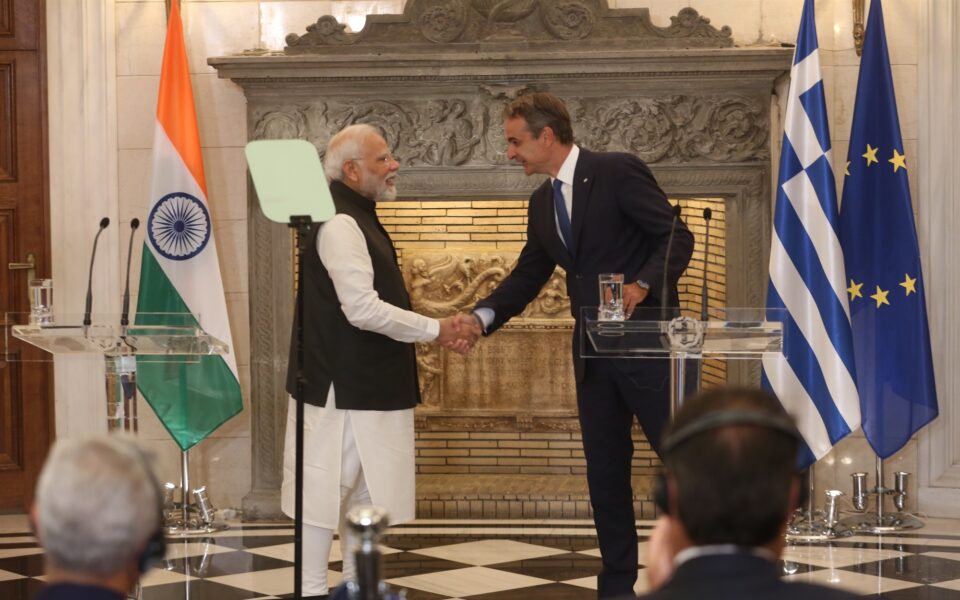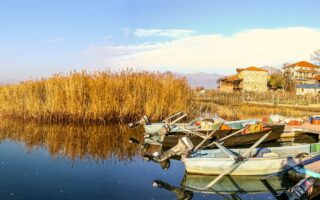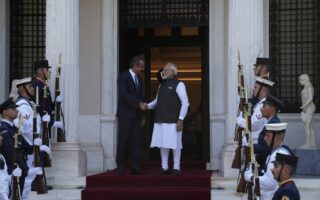Greece in the Indo-Pacific

The recent visit of Indian Prime Minister Narendra Modi to Athens opens a new chapter in bilateral relations which have been least-favoured for decades. Despite vast class inequalities and widespread poverty, India has emerged as a major power in the Indo-Pacific region. With its dynamic economy, ambitious space program, the soft power of Bollywood and of course the size of its population, India aspires to star in the 21st century.
Athens may justifiably identify its interests with those of the United States and major European countries, but the harsh geopolitical reality dictates the tightening of relations with New Delhi. In any case, the Indian leadership shares US concerns about Chinese revisionism. It is no coincidence that the United Kingdom, France and Israel are in a hurry to develop their relations with India. For reasons of national interest, Greece must do the same.
There is a positive background for building a strategic relationship: Hellenistic heritage, the absence of a colonial past and the Six Nation Peace Initiative in 1984 have created a very favorable image of modern Greece in the Indian capital. However, Modi’s interview in Kathimerini was revealing about his way of thinking. New Delhi supports the creation of a multipolar world, promoting its cultural self-confidence and its own values. Athens, therefore, must take into account the role of culture in Indian foreign policy to avoid Western-centric obsessions.
In any case, through India, our country has a significant opportunity to increase its footprint in the critical Indo-Pacific zone. It is a vast area that gathers 60 percent of the world’s population and two-thirds of the world’s economy. The geostrategic value of the Indo-Pacific also lies in the fact that 50% of world trade passes through those two oceans. The South China Sea is already a field of military competition between China and the US, while the Strait of Malacca is one of the most important shipping lanes in the world.
Almost inevitably, for decades, Greek foreign policy has focused on its disputes with Turkey. However, regardless of the evolution of Greek-Turkish relations, the international system is in a transitional phase that we cannot ignore. It is not yet clear whether the 21st century will be American, Chinese or even Indian. The only thing certain is that it will be the century of the oceans, since sea trade is constantly increasing. Due to its vast maritime tradition, strategic ports and Greek-owned maritime shipping, our country can serve as a critical link for maritime transport between Europe and the Indo-Pacific.
The United Kingdom, France and Israel are in a hurry to develop their relations with India, and for reasons of national interest, Greece must do the same
Aware of its potential, without overreaching, Athens must make a bold investment in the countries of the Indo-Pacific at the diplomatic, military and educational levels. Unfortunately, we don’t know enough about the Indo-Pacific and its problems. In addition to the US-China rivalry, the Kashmir conflict, the return of the Taliban in Afghanistan and military tensions on the Korean Peninsula create a situation of constant insecurity. With few embassies and many unpaid consulates, Athens cannot always monitor regional developments in an adequate and timely manner. The upgrading of the Greek diplomatic presence is a necessary condition for even a small involvement in regional events.
At the same time, military diplomacy must become an integral part of our foreign policy; with visits of Hellenic Navy ships to ports in the region and the participation of the Air Force in multinational exercises, Greece’s prestige will be strengthened. In the educational sector, scholarships can be given to young men and women from India and other countries in the region to study medicine or other subjects at Greek universities.
Today, more than ever, there is a need to redefine the long-term goals of Greek diplomacy on the basis of a new vision. Greece is a border and a bridge between continents, cultures and religions. This has always been the comparative advantage of the country which enlightened leaders have exploited for the benefit of our national interests. A new world is emerging before us, full of opportunities and threats. Greece will continue to belong to the West, but the future of humanity will be decided in the East.
Manos Karagiannis is a professor of international relations at the University of Macedonia and reader in international security at King’s College London.




